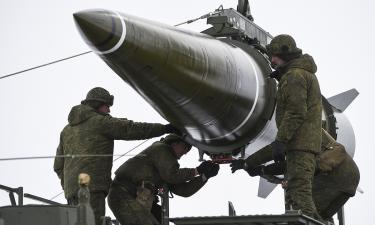Hillary Clinton’s second breath
US President George Bush has recently had a dinner in the White House with a possible new president of the nation – Senator John McCain. Bush supported the Republican Party’s candidate clearly, after 71-year-old McCain won the primaries in Texas, Ohio, Vermont and Rhode Island on March 4. The victory on Super Tuesday 2 won him the support of many delegates who will gather for the congress in September to nominate their presidential candidate.

McCain’s main opponent was former Governor of Arkansas, 52-year-old Mike Huckabee who previously achieved poor results in several southern states and dropped out of the race. He congratulated the former rival and promised to assist in the consolidation of the unity of Republicans. The conservative center of the party is suspicious and even hostile towards Arizona’s law-maker. Huckabee still cherishes hopes to become McCain’s partner as the vice-president, thus he could iron out differences between himself and his conservative party fellows.
As for Democrats, New York’s Senator Hillary Clinton, and her counterpart from Illinois, Sen. Barack Obama still march shoulder to shoulder, or as Clinton put it “foot to foot”. But March 4 was more successful for Clinton than it was for Obama: she won in her native state of Ohio (55 percent of votes), in Texas (51 percent of votes) and in tiny Rhode Island (58 percent of votes).
Mrs. Clinton did not conceal her enormous joy and assessed her threefold victory as a turning point in the election campaign. She even suggested that her counterpart and herself should take part in the election together (as presidential and vice-presidential candidates).
60-year-old Hillary Clinton was particularly grateful to the voters of Ohio: “This state knows how to elect presidents. In recent history no presidential candidate, whether a Democrat or a Republican, has entered the White House without winning primaries in Ohio.” But 46-year-old Barack Obama did not agree with her: “We have almost equal votes and equal chances,” he said.
The black politician with the impressive success (60 percent of votes) won the primaries in Vermont, the 12th consecutive state since the first Super Tuesday on February 5. He also won at the party convention (causus) in Texas, despite the fact that ex-president Bill Clinton travelled across the state urging electors to vote for his wife.
Altogether Barack Obama won the support of a great number of delegates out of 2,025 (about a hundred more than Clinton did) required to become the Democratic Party’s only candidate at the August national convention. So Clinton’s latest victories hampered Obama’s triumph and enabled her to ‘remain afloat’. Not more.
Nevertheless, the symbolic and practical value of Clinton’s threefold victory is enormous – her campaign got a second breath. “Without success in Ohio and Texas she would be doomed to end her struggle disgracefully,” Michael Barone, a coauthor of the Almanac of American Politics, said to Vremya Novostei.
Clinton and Obama will test their potentials again during the primaries of April 22 in Pennsylvania.
Vremya Novostei
Translated by Julia Bulygina
Pravda.ru
Subscribe to Pravda.Ru Telegram channel, Facebook, RSS!





